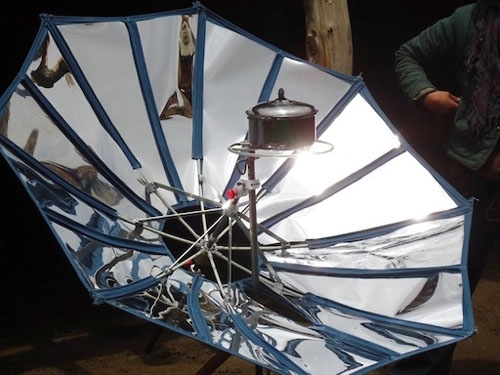One Earth Designs, a company spawned by an MIT student team to produce a low-cost portable solar cooker for use in developing countries, won the top prize last week in the Netherlands Green Challenge. Scot Frank ’08, who is CEO of the company, accepted the prize of 500,000 euros (about $667,000).
The company will use the money to help scale up production of the solar cookers in China. The umbrella-shaped device, made of yak wool and a thin reflective coating, is expected to sell for about $13. In addition to cooking food and boiling water, the portable device, which can be folded up and carried in a canvas bag, can be used to provide home heating and to generate power for lights or cellphones.
The company has begun testing of energy use and air quality in 400 homes in Tibet to establish a baseline, after which it will test the impact of introducing the solar device to those homes. Most cooking and heating in the region is presently provided by burning wood and yak dung, which can cause serious problems of indoor air pollution, Frank says. Senior Amy Qian was the company’s chief engineer, and the team also includes other MIT alumnae, as well as students from Harvard and Wellesley.
“I feel incredibly honored, on behalf of our whole team,” Frank said in accepting the prize from His Royal Highness Prince Friso of Orange-Nassau, the honorary jury chair. The prize will help to “make our dream come true,” he said.
The company will use the money to help scale up production of the solar cookers in China. The umbrella-shaped device, made of yak wool and a thin reflective coating, is expected to sell for about $13. In addition to cooking food and boiling water, the portable device, which can be folded up and carried in a canvas bag, can be used to provide home heating and to generate power for lights or cellphones.
The company has begun testing of energy use and air quality in 400 homes in Tibet to establish a baseline, after which it will test the impact of introducing the solar device to those homes. Most cooking and heating in the region is presently provided by burning wood and yak dung, which can cause serious problems of indoor air pollution, Frank says. Senior Amy Qian was the company’s chief engineer, and the team also includes other MIT alumnae, as well as students from Harvard and Wellesley.
“I feel incredibly honored, on behalf of our whole team,” Frank said in accepting the prize from His Royal Highness Prince Friso of Orange-Nassau, the honorary jury chair. The prize will help to “make our dream come true,” he said.






